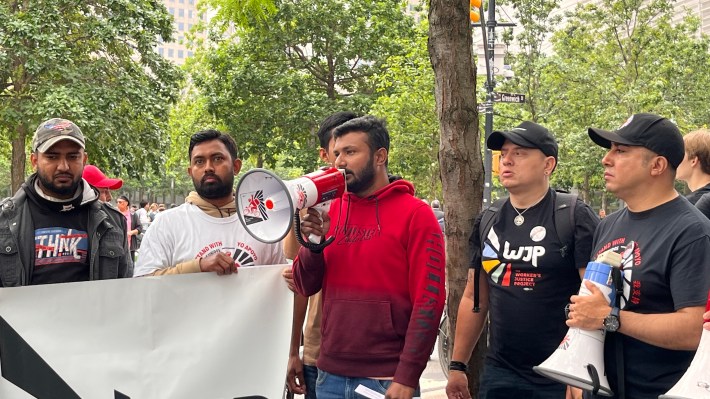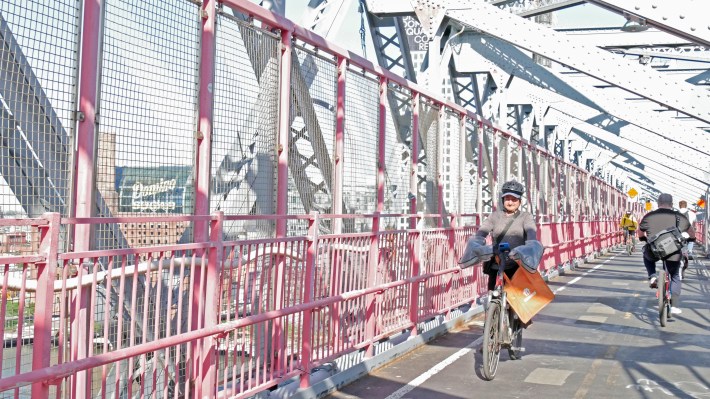More than 50 delivery workers have had their accounts deactivated by Grubhub in the past two weeks — and they're blaming the company's new owner, Wonder.
It didn't take long for the new industry power player — which finalized its $650-million purchase of Grubhub in January — to start flexing its muscles.
Since Wonder, formerly a prep-kitchen delivery service turned brick-and-mortar fast-casual enterprise, took the reins at Grubhub, it has started deactivating the accounts of workers who have been delivering for the company for years with no issues, workers say.
“I’ve worked hard for Grubhub for years. I’ve done nothing wrong other than work reliably for this company. I do not deserve to be deactivated like this – thrown away by the company like we don’t matter at all,” said Mamun Hossen, a delivery worker and organizer with Desis Rising Up & Moving. “We are human beings with families. This is our job. We’ve been loyal to this job and this company. We deserve some loyalty in return. We deserve to be protected from abuse like this.”

To protest the mass deactivation, Los Deliveristas Unidos, a group of delivery workers organizing for better working conditions, will gather outside of Wonder’s headquarters on Wednesday.
The mass deactivation — 52 confirmed workers at last count — reveals Wonder’s real intentions when it comes to its workforce, the group said.
“It’s ruthless and unjust to just throw workers away like this — and lie about the reasons for it,” said Luis Cortes, the director of Los Deliveristas Unidos, which has been organizing against these types of deactivations since the pattern began after the minimum wage went into effect in 2023. "This is an injustice that also affects hundreds of family members who depend on this income. It leaves those families increasingly vulnerable, with their futures hanging in the balance."

The minimum wage has been a success on paper for the industry's already marginalized immigrant workforce. Now, restaurant delivery workers earn a guaranteed $21.44 per hour of active time on the app, before tips.
But even though workers are on a whole making more money for their active time (or the time they spend riding between the restaurant and the destination), Los Deliveristas Unidos has documented lockouts and deactivations from the app companies, which they see as retaliation against workers for the minimum wage laws.
“Across the app delivery industry, we continue to see an epidemic of unjust deactivations like this,” said Cortes.
The workers are demanding the company immediately reactivate their accounts and are calling on the City Council to protect workers from this situation. Council Member Tiffany Cabán's bill, known as the "Secure Jobs Act," would require companies give reason for terminating employment, even gig workers. The bill was introduced in 2022 and no hearing has been scheduled.
Lawyers say this type of protection is key for delivery workers.
"It is urgent that the City Council move quickly on this," said Paul Sonn, program director at the National Employment Law Project. "Other cities have already adopted these protections and this merger highlights how it's needed for delivery workers."
E-bikes and those who ride them have become a major talking point in the race for mayor. And DoorDash, another app delivery company, has thrown big money to both Andrew Cuomo and Council Speaker Adrienne Adams. So far, Wonder has not disclosed any contributions.
A new giant in the delivery industry
Wonder is trying to build a delivery empire by acquiring companies, opening brick-and-mortar locations in the tri-state area and raising hundreds of millions in venture capital funding.
According to the website there are 69 Wonder storefronts spread through Manhattan, Brooklyn, Westchester, and New Jersey. In addition to Grubhub, Wonder has bought Relay, another app delivery company; Blue Apron, a grocery delivery service; and Tastemade, a media company focused on recipe videos.
The privately owned company was founded in 2018 by billionaire businessman Marc Lore, who once ran e-commerce at Walmart after founding and selling other e-commerce startups. Wonder differs from the usual app company structure by having storefront food pickup windows churning out recipes from known restaurants and celebrity chefs. Wonder’s kitchens make the meal delivery process more streamlined.
“Wonder is a vertically integrated food-delivery platform. So think Grubhub, but we actually own the restaurants. So we both do the delivery, we own the restaurants, and we cook the food. That enables us to have a superior delivery experience,” said Lore in an interview with Fast Company.
The company’s goal seems to be to eliminate as many workers from the food industry as possible. Lore boasts in another interview that each Wonder location can serve hundreds of menu items with as little as two staffers by “inventing new ways of cooking food where we can replicate the quality, but also do it with a lot less labor.” With Wonder, customers can order from five different “restaurants” (really just brands under the Wonder umbrella) and get it all delivered in under 30 minutes.
The deactivations come as Mayor Adams and his Police Commissioner Jessica Tisch have been ramping up enforcement against delivery workers and proposing new rules that advocates say would make it harder for them to do their jobs.
After publication a Wonder spokesperson told Streetsblog that each location has a full front and back of house team and that it expects to employ 3,700 restaurant employees by the end of the year.
The spokesperson sent a statement addressing the account deactivations: We don’t take deactivations lightly. In this case, many of the recently deactivated accounts were either duplicates or being shared with multiple parties, which we can’t allow for safety reasons and is against our delivery partner agreement. Deactivations can be appealed, and we encourage drivers to do so if they believe theirs was done in error. Yesterday we met with the Deliveristas leadership to discuss working together to address the accounts that they believe were deactivated in error so that delivery partners in good standing who want to deliver are able to do so.
These deactivations have no relation to the Wonder acquisition or the minimum pay law. Grubhub has always reviewed and taken action on duplicate and shared driver accounts upon receiving any reports of the same and after investigation, to ensure the safety of our platform.






